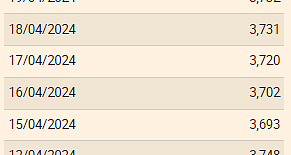The mutilation of the external genital organs is one of the cruelest and most serious human rights violations against girls and women - and at the same time probably the most widespread. According to Unicef, at least 200 million women are affected worldwide. Genital mutilation is still a daily practice, especially on the African continent and in Asia. And with the worldwide migration movements, the topic has long since arrived in Germany.
As the women's rights organization Terre des Femmes (TDF) announced on Thursday, the number of girls and women currently affected and threatened by circumcision in Germany is high. According to estimates by the TDF experts, there are currently almost 104,000 genitally mutilated girls and women living in Germany. And up to 17,000 girls under the age of 18 are potentially at risk of falling victim to this practice - either illegally in Europe or during so-called "holiday circumcisions" in their country of origin.
“Female genital mutilation is a deeply misogynistic and human rights-violating practice. The women are marked for their lives with it," said TDF Federal Managing Director Christa Stolle. France, the Netherlands and Germany in particular have a high proportion of immigrants from countries that practice genital mutilation. For the whole of Europe, the European Parliament estimates the number of those affected at 600,000 and the number of girls at risk at 180,000.
For the German estimate of unreported cases, Terre des Femmes transferred the prevalence rates from the countries of origin, i.e. the percentage of circumcisions, to the immigrant women. It is assumed that the women who immigrated in the first generation are affected by genital mutilation just as often as the women still living in the country of origin, said TDF expert Sonja Störmer. In Ethiopia, for example, the circumcision rate is 65 percent, in Egypt 87 percent and in Somalia even 99 percent.
Estimating how many second-generation immigrant girls are still threatened by the barbaric practice is more difficult. Terres des Femmes has designed a minimum and a maximum scenario based on an "acculturation factor". In the minimum scenario, immigrants adapt very quickly to the values of the host country; the threat to the daughters is low in this case. In the maximum scenario, only a small amount of adaptation takes place, which increases the risk for the girls. According to TDF calculations, the range is between 2,000 and 17,000 girls at risk. "We urgently need improved data in Germany in order to effectively protect girls through targeted prevention and to be able to provide better care for those who are already affected," said Störmer.
In order to be able to have a more effective impact on migrant milieus, Terres des Femmes works with community trainers from the relevant countries of origin. Like the human rights activist Fatou Mandiang Diatta from Senegal. "Especially among older people, there is often a concern that traditions will disappear," says Diatta. "We're trying to suggest to them that you can also do a symbolic initiation rite that leaves the girls unharmed."
According to the findings of the women's rights organization, the interventions usually take place during stays in the home country or in large diaspora communities in France, the Netherlands or Belgium. "But we strongly assume that it will also happen in Germany," said Störmer.
In fact, the data situation here is very thin, as shown by the federal government's response to a small request from AfD MP Stephan Brandner, which WELT has available. According to this, the police crime statistics between 2014 and 2021 recorded just nine cases of the criminal offense “female genital mutilation” introduced in 2013 according to Section 226a of the Criminal Code. Five of the suspects were from Nigeria, one from Ethiopia and one from Somalia. Only four people have been convicted since 2014.
"Kick-off Politics" is WELT's daily news podcast. The most important topic analyzed by WELT editors and the dates of the day. Subscribe to the podcast on Spotify, Apple Podcasts, Amazon Music or directly via RSS feed.

 The Euribor today remains at 3.734%
The Euribor today remains at 3.734% Germany: the trial of an AfD leader, accused of chanting a Nazi slogan, resumes this Tuesday
Germany: the trial of an AfD leader, accused of chanting a Nazi slogan, resumes this Tuesday New York: at Columbia University, the anti-Semitic drift of pro-Palestinian demonstrations
New York: at Columbia University, the anti-Semitic drift of pro-Palestinian demonstrations What is Akila, the mission in which the Charles de Gaulle is participating under NATO command?
What is Akila, the mission in which the Charles de Gaulle is participating under NATO command? What High Blood Pressure Does to Your Body (And Why It Should Be Treated)
What High Blood Pressure Does to Your Body (And Why It Should Be Treated) Vaccination in France has progressed in 2023, rejoices Public Health France
Vaccination in France has progressed in 2023, rejoices Public Health France Food additives suspected of promoting cardiovascular diseases
Food additives suspected of promoting cardiovascular diseases “Even morphine doesn’t work”: Léane, 17, victim of the adverse effects of an antibiotic
“Even morphine doesn’t work”: Léane, 17, victim of the adverse effects of an antibiotic MEPs validate reform of EU budgetary rules
MEPs validate reform of EU budgetary rules “Public Transport Paris 2024”, the application for Olympic Games spectators, is available
“Public Transport Paris 2024”, the application for Olympic Games spectators, is available Spotify goes green in the first quarter and sees its number of paying subscribers increase
Spotify goes green in the first quarter and sees its number of paying subscribers increase Xavier Niel finalizes the sale of his shares in the Le Monde group to an independent fund
Xavier Niel finalizes the sale of his shares in the Le Monde group to an independent fund Owner of Blondie and Shakira catalogs in favor of $1.5 billion offer
Owner of Blondie and Shakira catalogs in favor of $1.5 billion offer Cher et Ozzy Osbourne rejoignent le Rock and Roll Hall of Fame
Cher et Ozzy Osbourne rejoignent le Rock and Roll Hall of Fame Three months before the Olympic Games, festivals and concert halls fear paying the price
Three months before the Olympic Games, festivals and concert halls fear paying the price With Brigitte Macron, Aya Nakamura sows new clues about her participation in the Olympics
With Brigitte Macron, Aya Nakamura sows new clues about her participation in the Olympics Skoda Kodiaq 2024: a 'beast' plug-in hybrid SUV
Skoda Kodiaq 2024: a 'beast' plug-in hybrid SUV Tesla launches a new Model Y with 600 km of autonomy at a "more accessible price"
Tesla launches a new Model Y with 600 km of autonomy at a "more accessible price" The 10 best-selling cars in March 2024 in Spain: sales fall due to Easter
The 10 best-selling cars in March 2024 in Spain: sales fall due to Easter A private jet company buys more than 100 flying cars
A private jet company buys more than 100 flying cars This is how housing prices have changed in Spain in the last decade
This is how housing prices have changed in Spain in the last decade The home mortgage firm drops 10% in January and interest soars to 3.46%
The home mortgage firm drops 10% in January and interest soars to 3.46% The jewel of the Rocío de Nagüeles urbanization: a dream villa in Marbella
The jewel of the Rocío de Nagüeles urbanization: a dream villa in Marbella Rental prices grow by 7.3% in February: where does it go up and where does it go down?
Rental prices grow by 7.3% in February: where does it go up and where does it go down? Europeans: “All those who claim that we don’t need Europe are liars”, criticizes Bayrou
Europeans: “All those who claim that we don’t need Europe are liars”, criticizes Bayrou With the promise of a “real burst of authority”, Gabriel Attal provokes the ire of the opposition
With the promise of a “real burst of authority”, Gabriel Attal provokes the ire of the opposition Europeans: the schedule of debates to follow between now and June 9
Europeans: the schedule of debates to follow between now and June 9 Europeans: “In France, there is a left and there is a right,” assures Bellamy
Europeans: “In France, there is a left and there is a right,” assures Bellamy These French cities that will boycott the World Cup in Qatar
These French cities that will boycott the World Cup in Qatar Serie A: Bologna surprises AS Rome in the race for the C1
Serie A: Bologna surprises AS Rome in the race for the C1 Serie A: Marcus Thuram king of Italy, end of the debate for the position of number 9 with the Blues?
Serie A: Marcus Thuram king of Italy, end of the debate for the position of number 9 with the Blues? Milan AC-Inter Milan: Thuram and Pavard impeccable, Hernandez helpless… The tops and flops of the derby
Milan AC-Inter Milan: Thuram and Pavard impeccable, Hernandez helpless… The tops and flops of the derby Ligue 2: Auxerre leader, Bordeaux in crisis, play-offs... 5 questions about an exciting end of the season
Ligue 2: Auxerre leader, Bordeaux in crisis, play-offs... 5 questions about an exciting end of the season


















